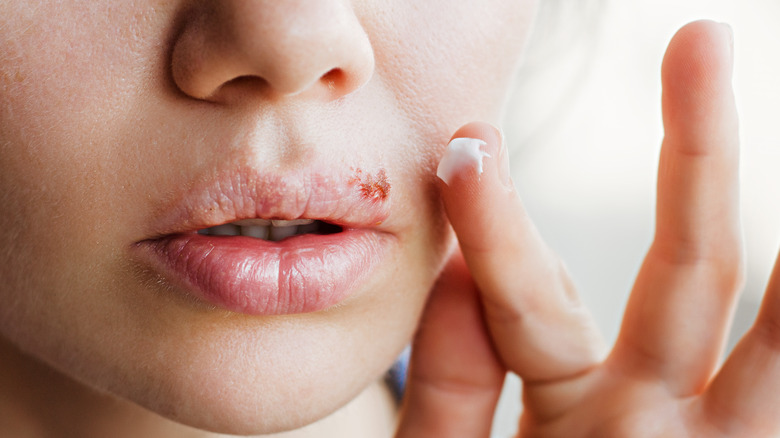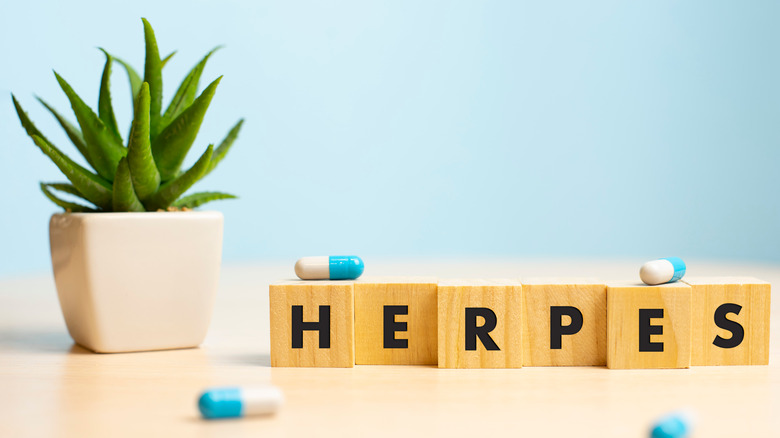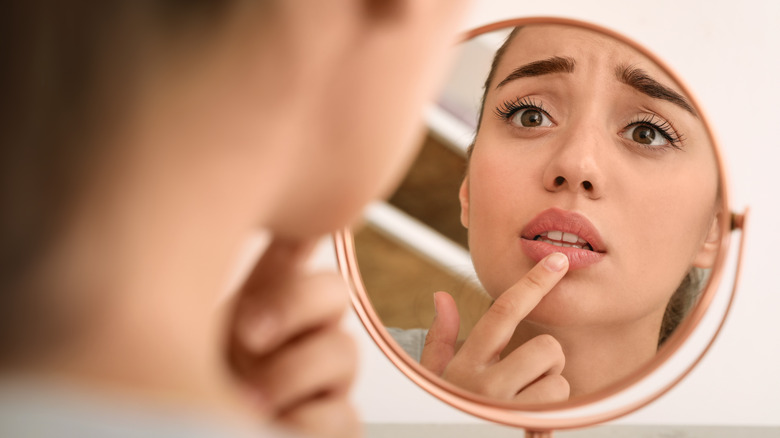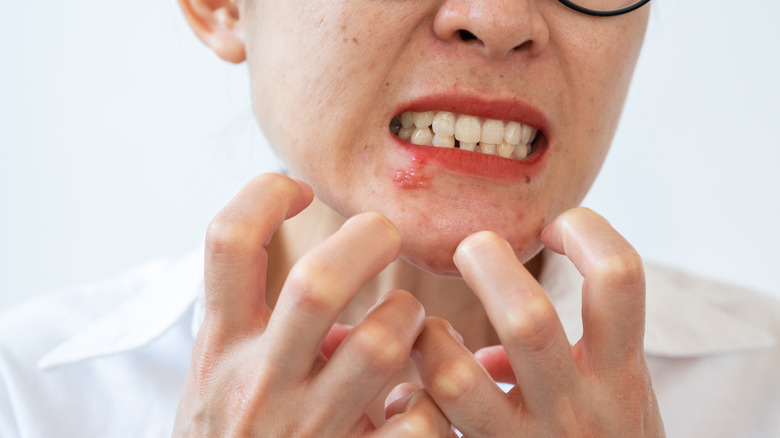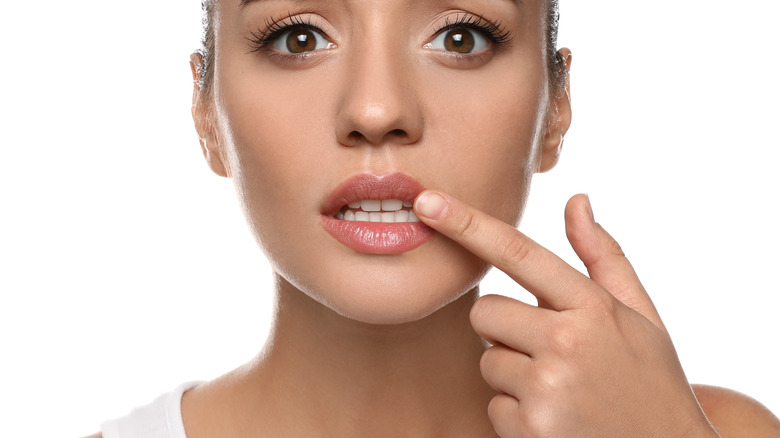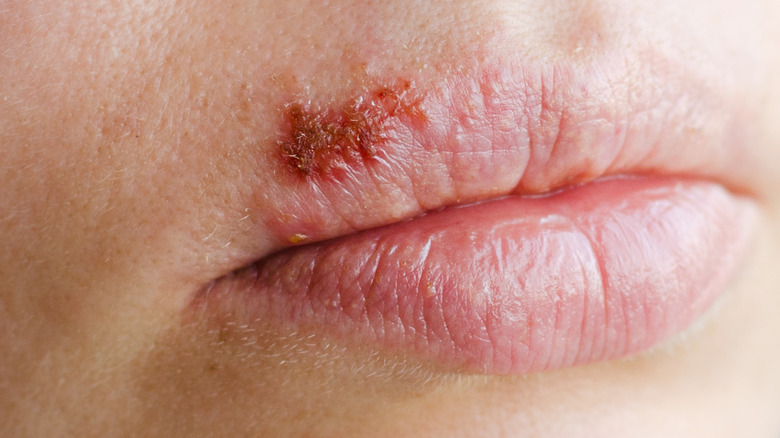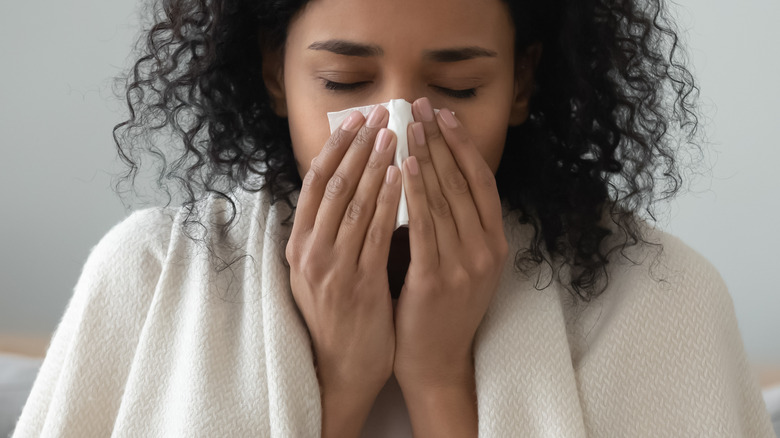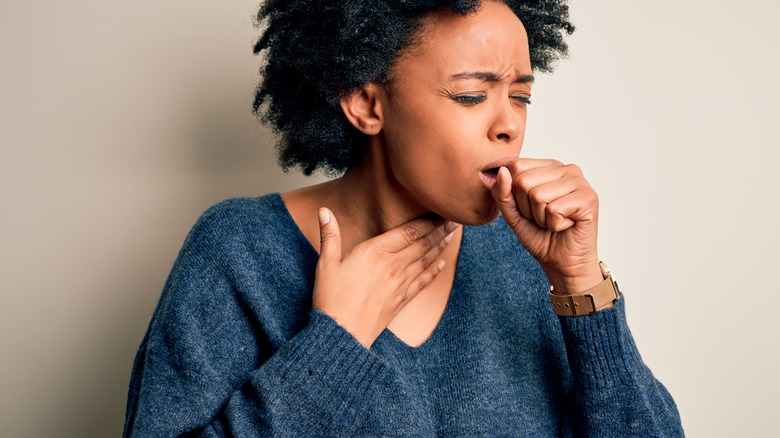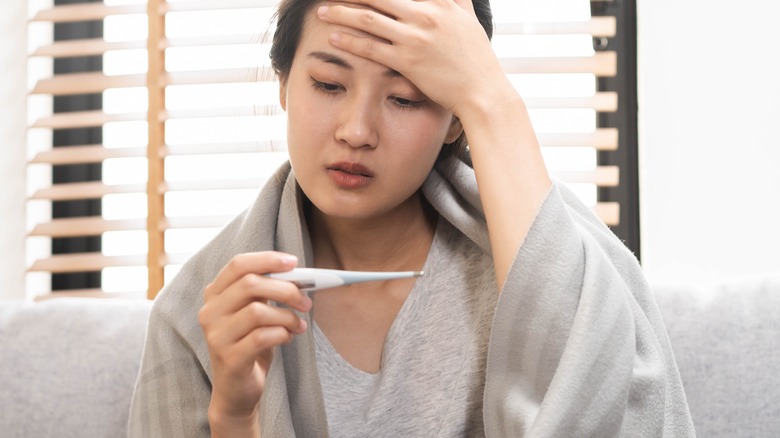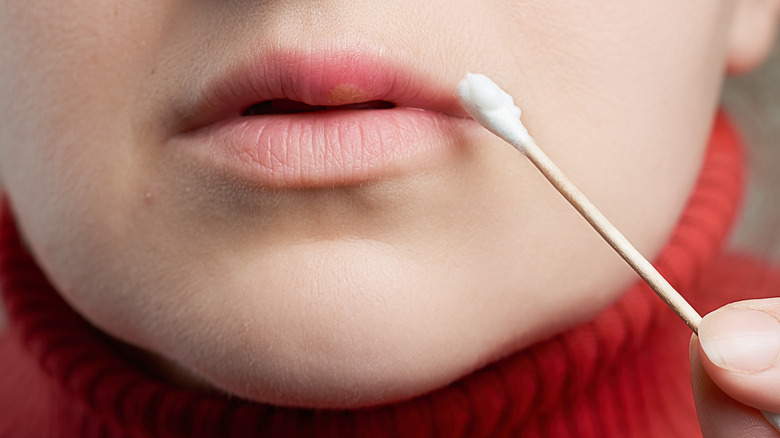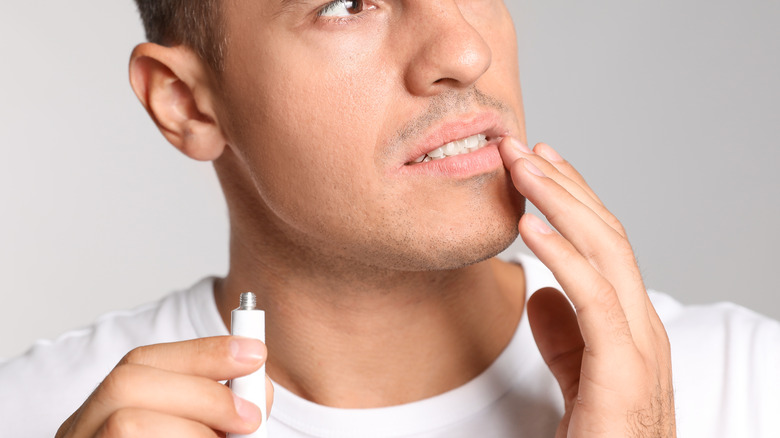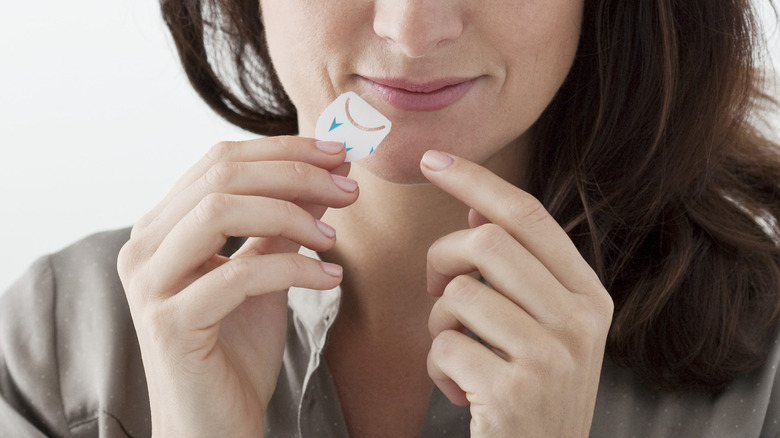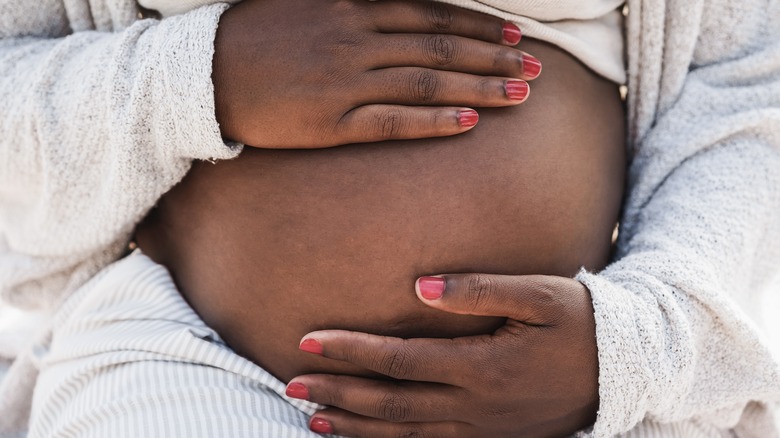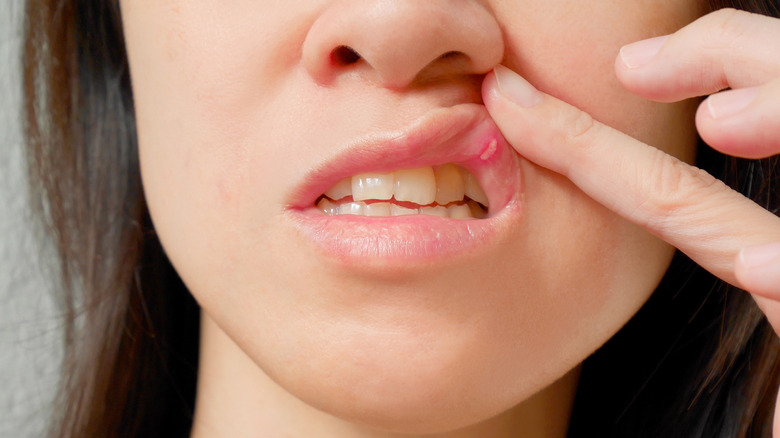Cold Sores Explained: Causes, Symptoms, And Treatments
If you've never dealt with a cold sore, count yourself lucky. These pesky blisters like to make an appearance on the lips, and they love overstaying their welcome.
What people might at first write off as a pimple emerging sometimes turns out to be a cold sore. They are easily recognizable once they appear in all their gory glory. Cold sores are basically a blister (sometimes clusters of them) that are filled with fluid (via Cleveland Clinic). While they appear on the lips, they can also appear in the area around your mouth. People commonly refer to cold sores as fever blisters, but it's also known as herpes labialis or oral herpes. Cold sores can last up to two weeks before they take their leave, according to Johns Hopkins Medicine. While cold sores can wreak havoc on your self-esteem for a few days and be quite uncomfortable, they're not usually a threat to your health, and are actually quite common.
In the United States alone, more than half of the population is infected with the virus that triggers cold sores. Some are lucky and never deal with cold sores as a result of the virus, but around 20% to 40% do develop cold sores as a result at some point (per Cleveland Clinic). If you're one of those folks who frequently deal with these blisters, read on for everything you need to know about what they are, how to recognize them, and the best ways to treat them.
Cold sores are caused by the herpes simplex virus
It might come as a surprise to some that cold sores are actually a symptom of an underlying condition. These blisters form as a result of the herpes simplex virus. There are two strains of this virus, but the herpes simplex 1 virus (HSV-1) is usually the culprit behind cold sores. "HSV-1 is more frequently associated with oral breakouts, and herpes simplex 2 with genital infections, although either type can affect either area," board-certified dermatologist Dr. Robert Anolik told Prevention.
Around 50% of US citizens under the age of 50 are carriers of the HSV-1 virus. Many don't know that they have the virus, since symptoms aren't usually serious, according to Cleveland Clinic. Small children can also get this virus, and usually develop small cold sores outside and even inside their mouths when they first contract it.
Unfortunately, HSV-1 cannot be cured, and you'll have to deal with the side effects for the rest of your life. Luckily, the virus isn't active all the time, so most of the time it simply sticks around in your nerve cells until something triggers it. Then the virus goes about its business and starts manifesting as cold sores.
Cold sores are contagious
The sucky thing about cold sores is that they are highly contagious. Skin-to-skin contact with an infected person almost guarantees that you'll get infected, too. Sex is another way HSV-1 and HSV-2 can spread, board-certified dermatologist Dr. Susan Bard told Women's Health. Many people contract the herpes simplex virus when they're still kids. "Most individuals are infected in childhood, usually from sharing utensils with other infected family members or coming in close contact with others who are infected in situations like daycare," Bard explains.
As you can see, contracting the virus isn't a hard thing to do. Even when someone's cold sores have disappeared, they can still be contagious because the virus can continue to live on in the skin cells they shed — yikes! It appears the only way to prevent spreading the virus to someone else is by covering yourself in plastic wrap.
While it's easy to infect others, you can also spread cold sores to the rest of your body if you're having a flare-up, Bard says. If you touch the cold sore and then your eye, for example, you might develop a similar blister on your eyeball (ouch). When you go for certain treatments like peels, keep in mind that they can cause the virus to poke out its ugly head, leading to sores on your entire face. It's imperative you let your dermatologist know if you get cold sores so they can prescribe a preventative treatment, board-certified dermatologist Dr. Rebecca Kazin says.
Cold sores are usually recurring
We've established that cold sores suck, but what makes them really annoying is that they are recurring — you'll never be completely free of them.
Since the herpes virus can't be eradicated from the body, you'll always be at risk of developing cold sores whenever your immune system is too occupied to offer resistance, board-certified dermatologist Dr. Rebecca Kazin told Women's Health. She adds that this is why you'll usually notice cold sores popping up when you're dealing with something else that requires your immune system's assistance, like being overly stressed, sick, or even sunburnt.
Speaking to Prevention, board-certified dermatologist Dr. Robert Anolik stated that reactivation of the herpes virus is the cause of cold sores in up to 40% of people. "Recurrent lesions appear most often on the border of the lip," Anolik explains. Basically, the virus is taking a nap right beneath your skin's surface, and every now and then something wakes it up, after which it starts to wreak havoc. While most people don't deal with cold sores all the time, some might find that they pop up way too often. Board-certified dermatologist Dr. Susan Bard says that cold sores recurring more than six times within the span of a year is a sign that you should seek medical treatment. You don't have to suffer in silence. According to Bard, your doctor can prescribe daily treatment that can help prevent these blisters from popping up on a regular basis.
The following symptoms indicate a cold sore
We'll forgive you if you've rigorously applied a pimple treatment to a cold sore before. It's easy to mistake it for a zit at first, but there are some telltale signs that you're dealing with a blister.
Cold sores, much like giant zits, make their presence known before you can spot them. Discomfort might start a day or two before the blister physically pops up on your face. "The most common symptoms include tingling, itching, or burning sensations even before the blisters or sores can be seen," board-certified dermatologist Michael Kassardjan, D.O., told Prevention. This is usually the best time to start treating the blister, according to Healthline. If you're still in doubt, the redness, pain, and swelling in the area as the cold sore forms will be a dead giveaway, according to Cleveland Clinic.
As the cold sore develops, more symptoms will show up. You'll notice a red blister filled with fluid that's painful to the touch, and in some cases, you might notice other cold sores forming in the same area. Other symptoms that might be present are aching muscles or lymph nodes that are swollen. You might also run a fever. While these symptoms are common and not a cause for concern, you should get medical treatment ASAP if you notice any changes to your eyes or vision. Since the herpes simplex virus can affect the eyes and even lead to permanent loss of vision, it's imperative you get treatment to prevent long-term damage.
Cold sores progress in stages
Cold sores, much like pimples, need to cycle through a few stages before they finally take their leave. According to Healthline, these blisters go through five stages. Knowing what each entails can help you figure out how well it's healing and how long you'll need to go to work with a paper bag over your head (just kidding, you have nothing whatsoever to feel self-conscious about).
Stage one starts as soon as your start to experience the first tell-tale symptoms of a cold sore. The itching and tingling typically make their appearance a day before the blisters start to form. Once the fluid-filled blisters appear in all their glory, you've reached stage two. Stage three is arguably the goriest: The blisters burst and start to ooze the liquid inside, then continue to form sores that can be quite painful. That brings us to stage four, which consists of the sores drying out and forming scabs. These scabs might itch and eventually crack. Once you reach this stage, the worst is over, and you'll finally have made it to stage five: The cold sore starts to heal and the scab eventually falls off, leaving you with your previous glowing and blemish-free complexion.
Some people are more susceptible to cold sores
Since the herpes simplex virus only remains dormant when your immune system isn't too tied up fighting another infection or illness, some people tend to be more susceptible to developing cold sores than others.
If you suffer from eczema, the herpes virus can not only enter your body more easily, but it can also wreak havoc on your health. According to the NHS, those who suffer from atopic eczema usually deal with broken and cracked skin. This creates the perfect opportunity for bacteria and viruses like the herpes simplex virus to enter. Once the virus is in your system, it can cause existing eczema to get worse and start to form the familiar classic cold sores on the skin. If not treated, the condition can progress to eczema herpeticum, which can be life-threatening. If you develop a rash accompanied by fluid-filled blisters that spread rapidly along with flu symptoms like fever, swollen lymph nodes, and fatigue, contact your doctor immediately (via the American Academy of Dermatology Association). If not treated, the blisters will eventually start to bleed, after which crusts will form. This can be incredibly painful.
If you have HIV/AIDS, you're also more susceptible to cold sores because your immune system is compromised. Those who don't receive treatment for HIV might find that they experience intense cold sore outbreaks that last for prolonged periods of time, according to Medical News Today. HIV patients should try to avoid people who have cold sores to prevent infection.
Certain things can trigger cold sores
According to Healthline, anything that requires your immune system's undivided attention can cause the herpes simplex virus to reactivate, the most common of which are colds, infections, and fever. However, illness isn't the only thing that can put your immune system into overdrive.
If you don't sleep enough, for example, you're setting yourself up for trouble. "Sleep is very important for multiple functions in the body, but especially for the immune system," Dr. Sarah Hochman told Women's Health. Going through a stressful period can also cause the immune system to respond, leading to cold sores. Some medications can also trigger the virus. This can include anything from chemotherapy to treatments for autoimmune diseases. Hochman says to inform your doctor if you notice cold sores popping up after starting a new course of medication. They can likely make adjustments so you don't suffer this side effect.
Aside from medication, hormones also play a vital role when it comes to your immune system, and if cold sores always seem to be popping up when you're on your period, you're not imagining it. "There are multiple kinds of changes in hormones around that time and that can have effects on the immune system," Hochman explains, adding that your doctor can prescribe treatment so you can avoid dealing with cold sores during that time of the month. Last, but not least, wear a lip balm and moisturizer with SPF when you're out and about, since sunlight is another trigger.
Cold sores could lead to some complications
While cold sores usually aren't anything to worry about, they can lead to complications in some cases. You're more likely to develop additional symptoms when you first contract the virus, according to Healthline. Young children are more prone to developing complications, some of which include having problems with breathing and swallowing, developing a fever, and having eyes that are irritated and red.
The virus might spread beyond the mouth to other parts of the body like the genitals, fingers, eyes, brain, spinal cord, and other parts of the skin, according to WebMD. Telltale signs that the virus is affecting your genitals is when ulcers or warts start to develop in that area. It can also appear on the anus. Blisters on the fingers during a cold sore outbreak are typically a sign that you've developed what is known as herpetic whitlow (via Medical News Today). If the herpes virus starts to affect your eyes, it will manifest as swelling, sores on the lids, and irritated eyes. If left untreated, it can lead to blindness. This condition is known as herpetic keratoconjunctivitis. Swelling in the brain, known as encephalitis, is another potentially life-threatening complication and needs to be treated immediately.
Cold sores can be treated successfully with medication
While cold sores can seem daunting, they are fairly easy to treat, and there are some over-the-counter options you can try to provide relief from the discomfort and pain. Anything that contains analgesic compounds like lidocaine and benzocaine will do the trick, according to Medical News Today, but they won't make the cold sore heal faster. Medications containing these compounds include Blistex, Anbesol, Cymex, and Orajel.
When it comes to applying these ointments to the cold sore, a Q-tip is usually best. You can use your finger, but keep in mind that you have to wash your hands before and after application. Never share your cold sore treatment with someone else. If you want to opt for oral pain relief medication, Advil and Tylenol will do the job.
If your cold sores are more severe, your doctor might prescribe an oral antiviral medication, according to Cleveland Clinic. If this treatment fails, doctors typically opt for intravenous antiviral medicine.
There are some home remedies you can try for cold sores
The good news is that cold sores can easily be treated at home most of the time. The experts at U.S. Dermatology Partners recommend you place a cold compress on the affected area to ease the burning and stinging that typically accompany the blisters. You can also opt to place a small bandage on the area to keep it clean. Additionally, applying petroleum jelly can help keep the area moisturized and protect your skin.
Healthline recommends opting for a lip balm that has lemon extract. You can also apply aloe vera gel to the affected area three times daily. Another natural treatment you can try is witch hazel, which can promote healing. Taking lysine supplements can also help. While they won't do anything to heal existing cold sores, they could help you experience less frequent outbreaks in the future if you take them regularly.
There are things you can do to prevent cold sores
While the herpes simplex virus is incredibly easy to contract, there are some things you can do to prevent getting infected, according to Cleveland Clinic. This includes avoiding touching your face unless you've washed your hands and refraining from sharing things like lip balm, cosmetics, cutlery, razors, towels, straws, and dishes with someone else. You should also avoid kissing someone with a cold sore, and refrain from engaging in oral sex with that person.
If you do get infected with the virus, there are still things you can do to prevent cold sore outbreaks, the most effective of which is to keep your immune system in tip-top shape. "Limit stress, eat a healthy diet, and try to get adequate sleep and exercise," Michael Kassardjian, D.O., told Prevention. He added that, since sunburns can trigger cold sores, you should ensure you apply a good lip balm that contains at least SPF 30 as well as zinc oxide for ultimate protection. If you have an existing cold sore, do not apply the lip balm directly to that spot. Instead, use a cotton swab or something similar that you can discard after each use.
Cold sores could complicate pregnancy
While the herpes simplex virus responsible for cold sores usually won't drastically affect pregnancy, there are instances where it can be dangerous to an unborn baby.
If you often get cold sores, there is a chance that the infection might spread to your genitals, and in cases like these, your doctor would typically suggest you give birth via cesarean section to eliminate the possibility of infecting the newborn baby, according to the NHS.
To prevent the risk in the first place, board-certified dermatologist Dr. Susan Bard recommends you be extra careful not to get infected with the virus for the first time while you're pregnant, since that is when you're most contagious and when the risk to the fetus is biggest. "I strongly recommend that pregnant women avoid sharing utensils or having mucosal [lips, genitals, etc.] contact with strangers or people they know have herpes," Bard told Women's Health. According to the Baby Center, getting infected with herpes in the first trimester can, in rare cases, lead to birth defects and miscarriage, since the virus might be able to make its way into the placenta that early in the pregnancy. Once again, prevention is key.
The difference between cold sores and canker sores
We'll forgive you if you thought cold sores and canker sores were the same things. While they can be equally painful, there are some key differences.
According to an article published by the University of Michigan, the key difference is in where these sores appear. Cold sores usually pop up on the outside of the mouth, whereas canker sores will form inside your mouth. Another key difference to look out for is how they appear. Cold sores look like blisters and start out looking clear, after which they become cloudy. They can sometimes appear inside the mouth, but this usually only happens when you are infected with the herpes simplex virus for the first time. Recurring sores almost always form on the lips.
Canker sores, on the other hand, can be identified by their gray or white color. The sore is usually accompanied by an inflamed area that appears red. You'll only ever find them inside your mouth, and the inside of the lips, cheeks, tongue and even your throat are their favorite spots. Another key difference between canker and cold sores is that the former isn't caused by a virus. In fact, doctors are still trying to figure out the cause (via Medical News Today). Last, but not least, it's good to keep in mind that canker sores are really good at healing on their own without medical treatment, whereas cold sores typically require over-the-counter or prescription medication.

